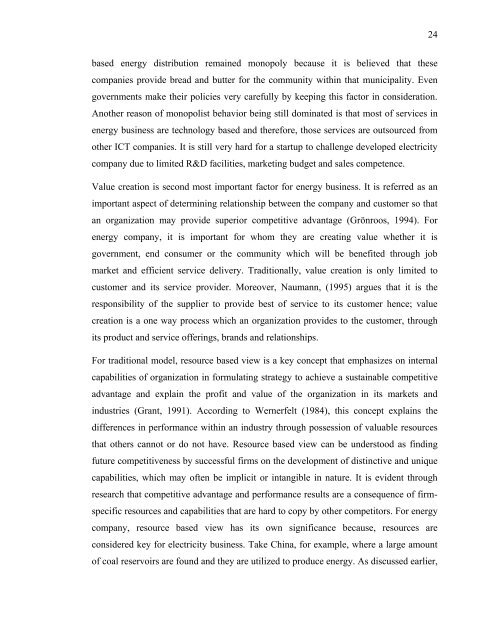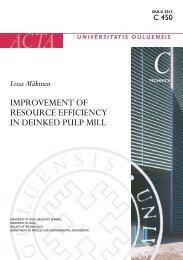Hassan Sherwani ROLE OF SALES AND MARKETING IN ... - Oulu
Hassan Sherwani ROLE OF SALES AND MARKETING IN ... - Oulu
Hassan Sherwani ROLE OF SALES AND MARKETING IN ... - Oulu
You also want an ePaper? Increase the reach of your titles
YUMPU automatically turns print PDFs into web optimized ePapers that Google loves.
24<br />
based energy distribution remained monopoly because it is believed that these<br />
companies provide bread and butter for the community within that municipality. Even<br />
governments make their policies very carefully by keeping this factor in consideration.<br />
Another reason of monopolist behavior being still dominated is that most of services in<br />
energy business are technology based and therefore, those services are outsourced from<br />
other ICT companies. It is still very hard for a startup to challenge developed electricity<br />
company due to limited R&D facilities, marketing budget and sales competence.<br />
Value creation is second most important factor for energy business. It is referred as an<br />
important aspect of determining relationship between the company and customer so that<br />
an organization may provide superior competitive advantage (Grönroos, 1994). For<br />
energy company, it is important for whom they are creating value whether it is<br />
government, end consumer or the community which will be benefited through job<br />
market and efficient service delivery. Traditionally, value creation is only limited to<br />
customer and its service provider. Moreover, Naumann, (1995) argues that it is the<br />
responsibility of the supplier to provide best of service to its customer hence; value<br />
creation is a one way process which an organization provides to the customer, through<br />
its product and service offerings, brands and relationships.<br />
For traditional model, resource based view is a key concept that emphasizes on internal<br />
capabilities of organization in formulating strategy to achieve a sustainable competitive<br />
advantage and explain the profit and value of the organization in its markets and<br />
industries (Grant, 1991). According to Wernerfelt (1984), this concept explains the<br />
differences in performance within an industry through possession of valuable resources<br />
that others cannot or do not have. Resource based view can be understood as finding<br />
future competitiveness by successful firms on the development of distinctive and unique<br />
capabilities, which may often be implicit or intangible in nature. It is evident through<br />
research that competitive advantage and performance results are a consequence of firmspecific<br />
resources and capabilities that are hard to copy by other competitors. For energy<br />
company, resource based view has its own significance because, resources are<br />
considered key for electricity business. Take China, for example, where a large amount<br />
of coal reservoirs are found and they are utilized to produce energy. As discussed earlier,
















